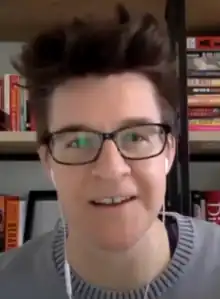Erica Chenoweth
Erica Chenoweth (born April 22, 1980) is an American political scientist, professor of public policy at the Harvard Kennedy School and the Radcliffe Institute for Advanced Study. They are known for their research work on non-violent civil resistance movements.[1]
Erica Chenoweth | |
|---|---|
 Chenoweth in 2020 | |
| Born | April 22, 1980 |
| Nationality | American |
| Alma mater | University of Dayton (BA) University of Colorado (MA, PhD) |
| Known for | Civil resistance studies |
| Scientific career | |
| Fields | International relations Political science |
| Institutions | John F. Kennedy School of Government Radcliffe Institute for Advanced Study Josef Korbel School of International Studies (University of Denver) (2012-2018) Wesleyan University (2008–2012) |
Education
Erica Chenoweth received their B.A. at the University of Dayton, followed by an M.A. and a Ph.D. from the University of Colorado. They previously taught at Wesleyan University until 2012 and completed postdoctoral fellowships at Harvard University and the University of Maryland.[2] Chenoweth joined the University of Denver faculty in 2012,[3] and the Harvard faculty in 2018.
Career
Between 2012 and 2018, Erica Chenoweth was professor at the University of Denver. They were a faculty member and PhD program co-director at the Josef Korbel School of International Studies.[2] They also directed the university's Program on Terrorism and Insurgency Research. They were also a researcher at the Peace Research Institute Oslo (PRIO).
Since 2018, they have been a professor of public policy at the Harvard Kennedy School and the Radcliffe Institute for Advanced Study of Harvard University.
Work
| External video | |
|---|---|
Together with Maria J. Stephan, who was then at the U.S. Department of State, Chenoweth co-wrote the book Why Civil Resistance Works. Chenoweth and Stephan organized an international team of scholars in identifying all the major violent and nonviolent governmental change efforts of the twentieth century.[4] They translated the results into a theory of civil resistance and its success rate for political change compared to violent resistance.[5]
Their team compared over 200 violent revolutions and over 100 nonviolent campaigns. Their data shows that 26% of the violent revolutions were successful, while 53% of the nonviolent campaigns succeeded.[4] Moreover, looking at change in democracy (Polity IV scores) suggest that nonviolence promotes democracy while violence promotes tyranny.
In the research data set, every campaign that got active participation from at least 3.5 percent of the population succeeded, and many succeeded with less.[1][4][6] All the campaigns that achieved that threshold were nonviolent; no violent campaign achieved that threshold.[7]
Their research work on non-violent civil resistance inspired the movement Extinction Rebellion.[1][8]
Awards
In 2012, Why Civil Resistance Works won the American Political Science Association's Woodrow Wilson Foundation Award for "the best book published in the U.S. during the previous calendar year on government, politics, or international affairs."[9]
Chenoweth, along with Stephan, also won the 2013 University of Louisville Grawemeyer Award for Ideas for Improving the World Order.[10] Past winners of this award include Mikhail Gorbachev and Robert Keohane.[11]
In December 2013, Foreign Policy named Chenoweth one of the Top 100 Global Thinkers of the year "for proving Gandhi right," noting their work on providing evidence for the efficacy of nonviolent political movements.[12] In 2013, Erica also won the Karl Deutsch Award (International Relations) for being "judged to have made the most significant contribution to the study of International Relations and Peace Research by the means of publication."[13]
Chenoweth was also awarded the International Studies Association award for "Best Group Blog of the Year" for the blog Violence @ a Glance, which they founded with Barbara F. Walter.
Bibliography
- Civil Resistance: What Everyone Needs to Know. N.Y.: Oxford University Press, 2021.
- Rethinking Violence: States and Non-State Actors in Conflict (2010)
- Chenoweth, Erica; Stephan, Maria J. (2011), Why Civil Resistance Works: The Strategic Logic of Nonviolent Conflict, Columbia U. Pr., ISBN 978-0-231-15683-7.
Ukrainian translation:
- Ченовет, Еріка; Стефан, Марія Дж. (2014), Чому ненасильницький спротив ефективний. Стратегічна логіка громадянського конфлікту, Видавництво "Кліо", ISBN 978-617-7023-14-1.
- Chenoweth, Erica, NAVCO Data Project, Sié Chéou-Kang Center for International Security & Diplomacy, Josef Korbel School of International Studies, University of Denver, retrieved 2017-03-17
References
- Editorial (21 October 2019). "The Guardian view on Extinction Rebellion: numbers alone won't create change". The Guardian. Retrieved 13 November 2019..
- "Erica Chenoweth Faculty Page". du.edu/korbel. University of Denver. Retrieved 1 Nov 2012.
- "Another Honor for the University of Denver's Erica Chenoweth". WIAReport. Women in Academia Report. 6 December 2012. Retrieved 12 February 2013.
- David Robson (14 May 2019). "The '3.5% rule': How a small minority can change the world". BBC. Retrieved 13 November 2019..
- "Success of Nonviolent Revolution". Academic Minute. Inside Higher Ed. Retrieved 15 November 2012.
- Erica Chenoweth (1 February 2017). "It may only take 3.5% of the population to topple a dictator – with civil resistance". The Guardian. Retrieved 13 November 2019..
- Chenoweth, Erica (2013-11-04). "My Talk at TEDxBoulder: Civil Resistance and the "3.5% Rule"". RationalInsurgent.org. Rational Insurgent. Archived from the original on 2019-06-22. Retrieved 2016-10-10.
- Roger Hallam (1 May 2019). "Now we know: conventional campaigning won't prevent our extinction". The Guardian. Retrieved 13 November 2019..
- "2012 Woodrow Wilson Foundation Award Recipient". Woodrow Wilson Foundation Award. American Political Science Association. Retrieved 2 November 2012.
- "Pair win world order prize for civil resistance study". The Grawemeyer Awards. University of Louisville. Retrieved 28 November 2012.
- "Previous Winners - University Of Louisville Grawemeyer Award For Ideas Improving World Order". The Grawemeyer Awards. University of Louisville. Archived from the original on 28 May 2013. Retrieved 28 November 2012.
- "Erica Chenoweth: For proving Gandhi right". Foreign Policy. December 2013. Archived from the original on 11 December 2013. Retrieved 12 December 2013.
- "Erica Chenoweth Receives Karl Deutsch Award – Peace Research Institute Oslo".